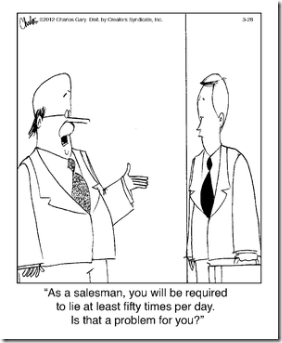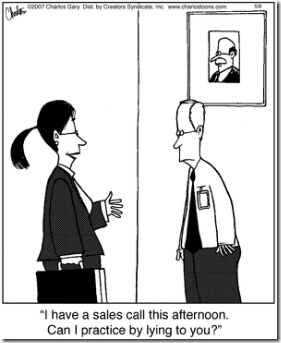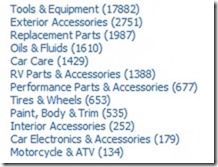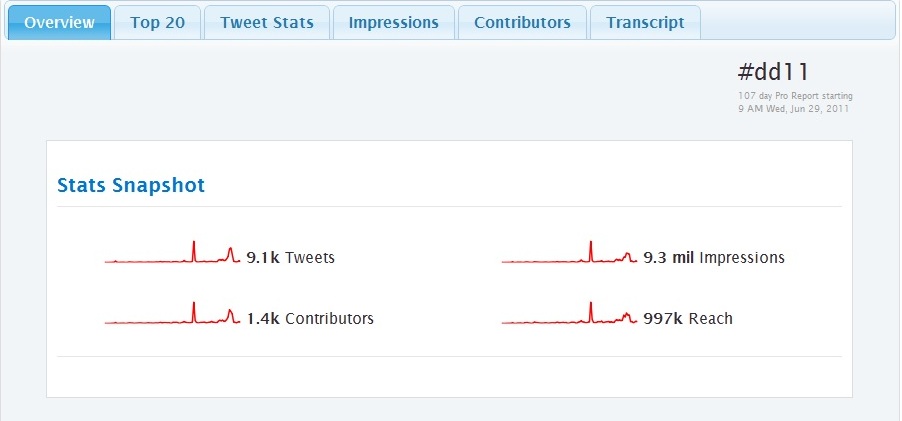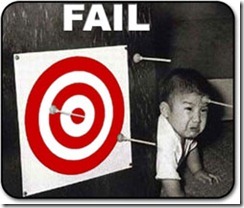For almost 3 years, I have been posting a comic every day on my Facebook account. I do this because I like to think I bring a smile to at least one person a day. I look through comics every morning in my attempt to share a “good” one. Yes, believe it or not, I do put effort into choosing which comic I post. I’ve started noticing a disturbing trend. Many comedians use reality-based comedy and it seems this also translates into comics. Syndicated comics, by their very nature, are designed to be funny and appeal to the masses. I see comics like these below on a regular basis and, personally, I do not find them funny. In fact, quite the opposite.
We all know that the history of sales (especially car sales) has earned us a bad and, some would argue permanent, reputation amongst consumers as being deceitful, manipulative and… well.. liars.
I think everyone can agree that, as an industry, there have been a lot of changes in how car dealers do business. Some of these perception-shifts have been due to the fact that consumers not only have more access to information but also because they have access to more dealers. In the past, consumers were limited to dealers in their local area. The number of dealers they could realistically get prices from and shop was limited by how many they could physically visit and how much time they had on their hands.
The increase in the amount of information available to consumers brought the ability to access more dealers in less time. It has also brought consumers a quick and easy way in which to analyze not only different prices via internet quotes but also to identify who they want to do business with. There have been many debates and opinions over time in various automotive industry forums on how dealers should interact with customers and how much information they should share as well as hostility towards consumers, vendors, OEMs and websites for sharing information which effects a dealer’s ability to profit from a sale. In my opinion, this only fuels the stereotype. Consumer’s have access to this information and it isn’t going away. Attempts to take it away and/or make it less available only serve to promote the negative image. Consumers already don’t trust dealers. Hiding (or reducing) the amount of information available to consumers will only make them trust dealers less.
No matter what you do, you will not be able to change this stereotype for our industry as a whole. You can, however, change how you do things at your store… which is a step in the right direction.
Here is my opinion on best practices:
- Be transparent. If a customer asks for information, give it to them. It doesn’t matter if they ask you in person, over the phone, via an e-mail or via a 3rd party lead submission. Chances are they already know the answer. Any attempt to dodge, evade or avoid answering the question will make the customer think you have something to hide.
- Establish and maintain a solid online reputation. Yes, consumers are increasingly looking at the various review sites and using that information to help decide whether to do business with you.
- Give consumers “real” numbers up-front. Many consumers already know most of them anyways. Don’t try to undervalue trade-ins or manipulate numbers on a pencil. The days of “scraping them off the ceiling” are over. This is an “old-school” mentality and its only outcome is detracting from your dealership’s integrity. They may still buy the car but they won’t leave with a great impression of your salespeople or dealership. Of course consumers are looking for a “good deal” but, I believe, they appreciate honesty.
- Get rid of bad apples. If you have salespeople or management staff who lie to customers, play games, or fudge numbers or information. Fire them. They will only hurt you in the long run. Customer don’t have loyalty because you didn’t earn it from them.
- Take care of your customers. Your customers are your life-blood. Dealerships have more income potential in fixed-ops than in sales. Treat them like royalty and they will come back.
- Pay attention to your customers. Many dealerships never contact customers post-sale until the dealer believes they may be in-market again. Follow-up processes should not simply be about selling them another car. It should be about appreciation. Call them on their birthdays and anniversaries. You have a better shot at selling them another car by not trying to sell them another car.
- Stop treating salespeople as expendable. Most customers don’t expect their salesperson to work at your dealership long. Be a company people want to work for. Reward and encourage employees to stay around. Get rid of managers that are quick to replace salespeople. Customers will notice.
- Engage your customers. Don’t just pop in and out of their lives to tell them about your upcoming sale. Once you’re in their lives, stay there. Use social media, blogs, newsletters, customer appreciation events, and any other tools you can to remain not only in their lives but in their minds.
While doing these things won’t change the perception of our industry as a whole, it CAN change the perception of the most important person in existence….
Your customer.
